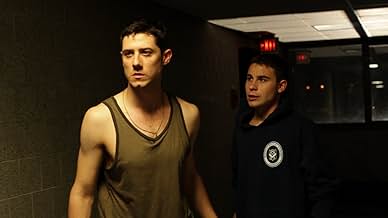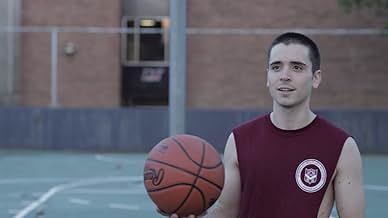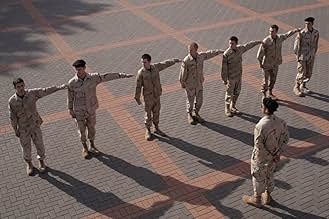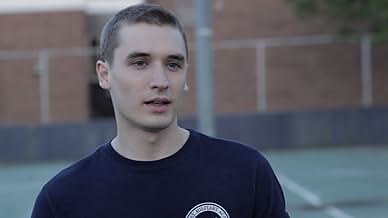AVALIAÇÃO DA IMDb
6,0/10
2,4 mil
SUA AVALIAÇÃO
Adicionar um enredo no seu idiomaA modern take on Shakespeare's 'Romeo and Juliet'. Set at an isolated all-boys military academy, it follows the forbidden relationship between two cadets.A modern take on Shakespeare's 'Romeo and Juliet'. Set at an isolated all-boys military academy, it follows the forbidden relationship between two cadets.A modern take on Shakespeare's 'Romeo and Juliet'. Set at an isolated all-boys military academy, it follows the forbidden relationship between two cadets.
- Prêmios
- 1 vitória no total
- Direção
- Roteiristas
- Elenco e equipe completos
- Produção, bilheteria e muito mais no IMDbPro
Enredo
Você sabia?
- CuriosidadesThe scenes of the cadet school and the lessons of the play "Romeo and Juliet" are in desaturated colors, gray, khaki, and pale. The scenes depicting the actual Shakespearean scenes are exhibited in deeply saturated colors.
- Erros de gravaçãoIn the first military drill, the orders are "left-right, left-right." The visuals are right-left, right-left. The "dress right" orders are correctly applied.
- Citações
Sam Singleton: I like your kicks, man. Those are nice.
- ConexõesFeatured in Private Romeo: Deleted Scenes (2011)
- Trilhas sonorasGlow
Performed by Screaming Lights
Courtesy of Epitaph
By Arrangement with Sugaroo
Avaliação em destaque
I loved and was entranced by this very beautiful, and beautifully done, movie. At first I was worried that the use of Shakespeare's original language was going to feel gimmicky or distracting (as it often has been in other projects...such as, in my opinion, in the Baz Luhrmann "Romeo+Juliet" film, which had other charms, to be sure, and I liked it a lot, but regarding the Shakespearean spoken dialog, I had felt that neither Leonardo DiCaprio nor Clare Danes, who are certainly otherwise good actors, had the slightest idea what they were actually saying), but instead, this film illuminated Shakespeare's language and I feel that I had rarely heard those words spoken with such beauty, clarity, and understanding. The actors completely inhabited those lines and from the powerfully projective strength of their voices, it was obvious to me that these were very talented and even classically-trained actors.
They all had the physical good looks that makes you think they could have been cast on looks, alone, and yet to see the actual TALENT they all had, was rather amazing. A little investigation later revealed that many, if not all, of them were far more interested in the New York and London theater scenes than they were in "Hollywood", and this film is probably not a "Hollywood" film, anyway.
For typical Hollywood film audiences, this film might have been narratively confusing in several different ways. For example, the director made the decision to retain the feminine gender pronouns in the dialog, and yet, despite the fact that this movie was set in an all-boys military academy, I didn't feel that these words were meant to be used insultingly or as put-downs, even when spoken to or about those in "enemy" camps. Nor was their use meant to take on a "drag queen" type of persona, like "say girl", and "she" this and that. No. These men were always clearly masculine, and especially so throughout all their wooing and love-making, and let's underscore that they were young WARRIORS, so no asking "who is the man and who is the woman in the relationship", they are both (as were all of them) MEN, okay?
For me, at any rate, it was almost automatic to either ignore the specificity of the gender pronouns (understanding that the original Shakespeare was being used without alteration or distortion), or, perhaps better, to transcend the sexual implications of gender into their spiritual qualities. For, in truth, it is only those with the least developed masculinity who are afraid to express love, to be tender and physically affectionate toward other men, to be caring and sheltering, for the fear that those qualities will "compromise" their masculinity (instead of what actually happens, it enhances it). And if sex, and marriage comes along with it, well, they're sovereign adults who know their own hearts.
I admit that were some aspects that I didn't quite get, such as why were these two "camps" enemies? They weren't from rival schools, they were in the same classrooms and shower rooms, but maybe they were on rival athletic teams within the school, and, being quite competitive naturally, any alliance across teams was frowned upon. But I never really quite got where that conflict came from. (Perhaps oversimplifying it, I can best think of this in "Harry Potter" terms, different "houses", that in this film the "Capulet" and "Montague" were equivalent to "Gryffendor" and "Slitherin".)
I did not pick up on any homophobia; it might have been there or alluded to or assumed, but I did not think that it specifically was the love between the two boys, AS two boys, that was, itself, a problem, and if I am right, then this unquestioned acceptance of that added quite a bit to the dream-like quality or maybe idealized atmosphere of the film. For then in the film's "dreamtime," then, they are beyond that issue (as it is way high time for it to be in our everyday world).
I am willing to accept that my various problems in understanding certain things indicates my imperceptions rather than failings in the construction of the film. A subsequent watching (which I am eager to do) may very well clear up every question.
But, instead of getting lost in the minutia of plot points and evaluating the correlation of the meaning between the original Shakespearean love story and a modern-day version set in an all-boys military school, I think it was much better to merely swim in the dreamy artistry and beauty of the project as a whole, to enjoy it as the work of art it is instead of merely as a narrative story.
The two boys, "Romeo" and "Juliet" were fantastic together while swirling in and speaking to one another Shakespeare's gorgeous words. It was enough to bring tears to my eyes. I think that Shakespeare, himself, would have loved this film, and from reading his "Sonnets", I especially think so! I am also reminded of another of his plays that I love, "As You Like It", where, in my view, love transcends "gender" (or, at least, the temporary appearance of gender).
All in all, despite a few minor flaws, this was a very worthwhile film to see and if you like Shakespeare at all, I think this film will increase your appreciation of his work (and to see how well it continues to universally apply), and if you hadn't known the director and the performers previously, the film introduces you to some seriously talented professionals whose careers are very much to be kept abreast of.
They all had the physical good looks that makes you think they could have been cast on looks, alone, and yet to see the actual TALENT they all had, was rather amazing. A little investigation later revealed that many, if not all, of them were far more interested in the New York and London theater scenes than they were in "Hollywood", and this film is probably not a "Hollywood" film, anyway.
For typical Hollywood film audiences, this film might have been narratively confusing in several different ways. For example, the director made the decision to retain the feminine gender pronouns in the dialog, and yet, despite the fact that this movie was set in an all-boys military academy, I didn't feel that these words were meant to be used insultingly or as put-downs, even when spoken to or about those in "enemy" camps. Nor was their use meant to take on a "drag queen" type of persona, like "say girl", and "she" this and that. No. These men were always clearly masculine, and especially so throughout all their wooing and love-making, and let's underscore that they were young WARRIORS, so no asking "who is the man and who is the woman in the relationship", they are both (as were all of them) MEN, okay?
For me, at any rate, it was almost automatic to either ignore the specificity of the gender pronouns (understanding that the original Shakespeare was being used without alteration or distortion), or, perhaps better, to transcend the sexual implications of gender into their spiritual qualities. For, in truth, it is only those with the least developed masculinity who are afraid to express love, to be tender and physically affectionate toward other men, to be caring and sheltering, for the fear that those qualities will "compromise" their masculinity (instead of what actually happens, it enhances it). And if sex, and marriage comes along with it, well, they're sovereign adults who know their own hearts.
I admit that were some aspects that I didn't quite get, such as why were these two "camps" enemies? They weren't from rival schools, they were in the same classrooms and shower rooms, but maybe they were on rival athletic teams within the school, and, being quite competitive naturally, any alliance across teams was frowned upon. But I never really quite got where that conflict came from. (Perhaps oversimplifying it, I can best think of this in "Harry Potter" terms, different "houses", that in this film the "Capulet" and "Montague" were equivalent to "Gryffendor" and "Slitherin".)
I did not pick up on any homophobia; it might have been there or alluded to or assumed, but I did not think that it specifically was the love between the two boys, AS two boys, that was, itself, a problem, and if I am right, then this unquestioned acceptance of that added quite a bit to the dream-like quality or maybe idealized atmosphere of the film. For then in the film's "dreamtime," then, they are beyond that issue (as it is way high time for it to be in our everyday world).
I am willing to accept that my various problems in understanding certain things indicates my imperceptions rather than failings in the construction of the film. A subsequent watching (which I am eager to do) may very well clear up every question.
But, instead of getting lost in the minutia of plot points and evaluating the correlation of the meaning between the original Shakespearean love story and a modern-day version set in an all-boys military school, I think it was much better to merely swim in the dreamy artistry and beauty of the project as a whole, to enjoy it as the work of art it is instead of merely as a narrative story.
The two boys, "Romeo" and "Juliet" were fantastic together while swirling in and speaking to one another Shakespeare's gorgeous words. It was enough to bring tears to my eyes. I think that Shakespeare, himself, would have loved this film, and from reading his "Sonnets", I especially think so! I am also reminded of another of his plays that I love, "As You Like It", where, in my view, love transcends "gender" (or, at least, the temporary appearance of gender).
All in all, despite a few minor flaws, this was a very worthwhile film to see and if you like Shakespeare at all, I think this film will increase your appreciation of his work (and to see how well it continues to universally apply), and if you hadn't known the director and the performers previously, the film introduces you to some seriously talented professionals whose careers are very much to be kept abreast of.
- thomasdosborneii
- 16 de jul. de 2011
- Link permanente
Principais escolhas
Faça login para avaliar e ver a lista de recomendações personalizadas
- How long is Private Romeo?Fornecido pela Alexa
Detalhes
- Data de lançamento
- País de origem
- Central de atendimento oficial
- Idioma
- Também conhecido como
- Private Romeo
- Locações de filme
- Chaminade High School, Mineola, Long Island, Nova Iorque, EUA(Gymnasium and Weight Room)
- Consulte mais créditos da empresa na IMDbPro
- Tempo de duração1 hora 34 minutos
- Cor
Contribua para esta página
Sugerir uma alteração ou adicionar conteúdo ausente

Principal brecha
By what name was Soldado Romeu (2011) officially released in India in English?
Responda























